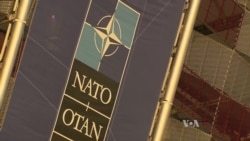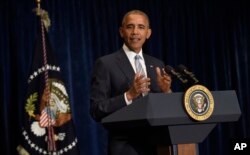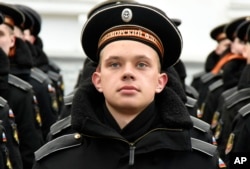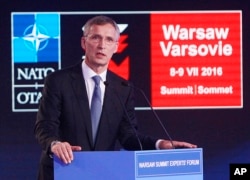It is being called the most critical NATO summit since the end of the Cold War.
U.S. President Barack Obama put Brexit at the top of his agenda on the first of days of meetings as NATO leaders voiced concerns of what the departure from the EU of NATO's other heavy-hitter, Britain, will mean for the security alliance.
The United States has a “strong and enduring interest” in a united Europe, and everyone has an interest in minimizing disruptions as the EU and Britain “forge a new relationship,” Obama said Friday after meeting with EU leaders at the start of the summit.
Brexit
With anxiety growing on the continent over the future of European integration after Brexit, the U.S. president offered reassurance to European leaders.
“I am absolutely confident that [Britain and the] European Union will work in a pragmatic fashion to ensure that the transition is orderly and smooth,” Obama said.
“We cannot lose sight of the achievement” that European integration has made, he added, noting that no EU member has ever raised arms against another.
Those are “achievements that have to be preserved,” Obama said.
Highlighting U.S. concern over Britain’s decision to leave the EU, Obama’s meeting with European Council President Donald Tusk and the European Council’s Jean-Claude Juncker was his first after arriving in Warsaw Friday.
British Prime Minister David Cameron told leaders Britain would not have a lesser role in the world after leaving the EU. "We are not turning our back on NATO," he said.
Russian aggression
But the official agenda Friday was dominated by talks about Russia, and what American officials say is Moscow's more assertive, more aggressive posture on NATO’s eastern.
Russia, NATO’s most militarily capable neighbor, continues to strengthen its military, and shows no sign of ending its involvement in Ukraine. U.S. officials see that as a growing potential threat to NATO members that once were part of the Soviet empire.
Washington sees this as a crucial time to forge a cohesive response for the alliance, and for the first time in a quarter century, one that focuses on deterrence.
“From NATO’s perspective, this summit comes at a real demarcation point, or an inflection point, in the now almost 70-year history of the alliance,” said Doug Lute, the U.S. ambassador to NATO.
Troop readiness
For the first time in NATO’s history, it has a high-readiness force - 13,000 troops poised for quick deployment in a crisis, currently based in Spain, President Obama’s next stop.
The summit will commit to deploying what Lute describes as a “modest” force - four rotating NATO battalions - in the former Soviet republics of Estonia, Latvia and Lithuania and in Poland. The U.S. has announced it will lead one of those battalions.
The additional force in NATO's eastern precincts will amount to up to 4,000 troops. Obama said 1,000 American troops will deploy in Poland; Britain is contributing 650 soldiers, most to go to Estonia.
Defense analysts say the added forces by themselves would not be enough to stop Russian aggression if Moscow decided to invade, but are meant to show Russia that NATO is serious about defending its members. The decision to deploy the four battalions followed pressure from the Baltic states, whose leaders complained that NATO was not fulfilling its promise to protect them.
NATO Secretary-General Jens Stoltenberg dismissed any suggestion that the alliance’s new deterrence posture could start a new Cold War. “NATO does not want a new Cold War. The Cold War is history and should remain history,” he said.
Officials hope to defuse tensions with Moscow at a dialogue between NATO and Russia in Brussels on Wednesday.
The decision to hold the NATO summit in Warsaw is highly symbolic. The Polish capital is where communist leaders signed the Warsaw Pact, a treaty linking what was then the Soviet Union with seven Eastern European states, known at the time as the "satellite nations" because of their domination by the Kremlin.
The Warsaw Pact members were NATO's principal adversary for decades - until agreed to dissolve their military and political partnership in 1991, after Soviet power collapsed across Eastern Europe.
The Warsaw Pact had been created on May 14, 1955 - five days after NATO added what was then West Germany as a member.
Friday evening, President Obama and the other NATO leaders dined at Poland’s Presidential Palace, the site where communist leaders signed their 1955 treaty.
Obama began his day Friday by addressing a tragedy at home, the killings of five police officers in Dallas. The U.S. leader said he was "horrified" by the events in Texas, which he denounced as a "vicious, calculated and despicable attack on law enforcement."








